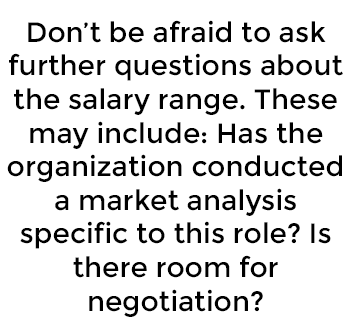


Campbell & Company supports these legislative efforts, and we believe similar laws will continue to take shape across the U.S. While organizations seek guidance amidst this change, jobseekers need their own set of do’s and don’ts. How can I prepare? What can I ask? How much should I share?
To help job candidates understand what a salary history ban means for them—and how to thrive under these new circumstances— our Executive Search team assembled five key recommendations:
 Don’t be afraid to ask further questions about the salary range. These may include: Has the organization conducted a market analysis specific to this role? Is there room for negotiation? Candidates often feel uncomfortable or apprehensive broaching the subject of salary early on in the hiring process. However, posing direct questions will ensure that you and the hiring manager stay in sync throughout the process.
Don’t be afraid to ask further questions about the salary range. These may include: Has the organization conducted a market analysis specific to this role? Is there room for negotiation? Candidates often feel uncomfortable or apprehensive broaching the subject of salary early on in the hiring process. However, posing direct questions will ensure that you and the hiring manager stay in sync throughout the process.
Discussing salary has always been tricky, but California’s recent salary history ban and other pay equity laws are seeking to create a fairer and more transparent job search process for everyone. My colleagues and I strive to be a resource to nonprofit jobseekers, so please don’t hesitate to leave a comment or contact me directly with questions.